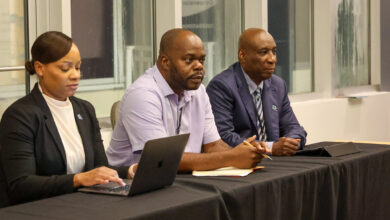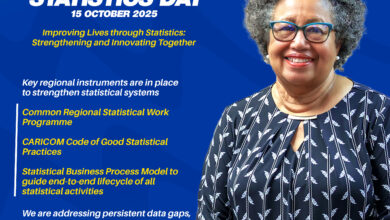Hon. Mia Mottley, Deputy Prime Minister, and Minister of Economic Affairs and Development of Barbados
Hon. Dale Marshall, Attorney-General and Minister of Home Affairs of Barbados, and Other Distinguished Representatives of the Government of Barbados
Mr. Jeremy Collymore, Coordinator, Caribbean Disaster Emergency Response Agency and Staff of CDERA
Distinguished Heads of Other CARICOM Institutions and Organisations
Members of the Diplomatic Corps
Representatives of the Private Sector
Representatives of Donor Agencies
Representatives of the Media
Distinguished Ladies and Gentlemen
Good Evening, to you all.
As Secretary-General of the Caribbean Community (CARICOM), it gives me great pleasure to address this Second Annual Comprehensive Disaster Management Conference which is being held under the theme “The Changing Landscape of Caribbean Disaster Management – Vision Becoming Reality”.
Let me at the outset congratulate the team at CDERA and particularly the Co-ordinator Jeremy Collymore, for their excellent contribution to the Caribbean Community’s efforts to address the critical issue of disaster management. Thanks in large measure to them, CDERA has become not only the premier Organisation in the management of natural disasters at the Regional level, but also a virtual household word.
In the words of the CDERA Co-ordinator himself, this Conference is intended to be the “Caribbean’s annual signature disaster management forum for reflection, dialoguing and measuring progress within the context of the enhanced Comprehensive Disaster Management Strategy”. This Conference is therefore fully in keeping with the Organisation’s motto: “Managing Disasters with Preparedness”.
The dialogue in which you are about to participate, is both pertinent and timely given the enormous toll that natural disasters have exacted on Caribbean societies and economies in the past; and indeed in the face of reportedly the second most powerful earthquake the Region has ever experienced, which took place just 12 days ago.
In the last decade alone, our societies and economies have borne a large burden in terms of loss of life and property due to various natural disasters. Some indication of the extent of this damage can be gleaned from the study by United Nations Economic Commission for Latin America and the Caribbean (UNECLAC) of the impact of natural disasters on four selected territories and countries in the Region – Cayman Islands, Grenada, Jamaica and Haiti – over the 24 year period 1980 to 2004.
That study indicated that more than 8,000 lives were lost; nearly six million persons – that is, more than fifty percent of the combined populations of the countries under reference – were affected; and an estimated US$5.6 billion dollars in damage was sustained. Some regional experts have projected that for damage of this magnitude, the recovery period will range from 5 to some 15 years.
The territories and countries of the UNECLAC study, like all CARICOM Member States, are Small Island Developing and Low-lying Coastal States (SIDS). They often suffer the harmful consequences of natural disasters, not only in terms of the immediate quality of life of their affected populations, but also to their long-term development prospects.
This is in large measure, as a result of their small size and limited capacity to reconstruct and recover from damage caused by such disasters. Coupled with that, they are virtually all in a hurricane zone. A classic example in this regard is Grenada which was struck by Hurricane Ivan in 2004, losing some 200 percent of its GDP, and which today still faces severe challenges of reconstruction from the effects of that hurricane.
It is within this context, that the challenges posed by our vulnerability, including that of our small size, have been and continue to be of great significance to our Region. This aspect of the phenomenon of our vulnerability also underscores the difficulties inherent in the movement of our Region into the global economy. It also brings home more acutely, the need for us in the Caribbean to heed the calls for disaster management and adaptation, particularly in the face of climate change. In this regard, we would be well advised to remember the words of the first Caribbean Nobel Laureate, Sir Arthur Lewis – himself a national of one of the SIDS, Saint Lucia – who in his seminal work, The Theory of Economic Growth, aptly pointed out that “Nature is not particularly kind to man; she can overwhelm man with disasters which man wards off [only] through thought and action”.
This leads me to make reference to various elements of our physical vulnerability common to CARICOM Member States such as hurricanes, floods, landslides, droughts, earthquakes and volcanoes – virtually all of which are exacerbated by the impact of climate change, including sea-level rise. It is the realisation of the exacerbating effect of climate change in relation to these various elements of our physical vulnerability, that as I speak, CARICOM, including its Secretariat, is represented at the highest technical level with delegates from all over the world in Bali, Indonesia for the United Nations Climate Change Conference 2007.
Our countries are taking an active part in the efforts being pursued there to develop a roadmap for a future international agreement on enhanced global action to deal with climate change in the period after 2012 – the year the first commitment period of the Kyoto Protocol expires.
For SIDS such as us in CARICOM, the Bali Conference is of critical importance. CARICOM Member States after all, are among those who contribute the least to climate change but regrettably are among the most affected by it. The effects of climate change, including global warming, ruthlessly exposes our vulnerability. Furthermore, given the fact that the societies and economies of CARICOM Member States – particularly the all-important tourism sector – are primarily located along the coastal zones, the effects are even more devastating.
A key element of the issue of disaster management in the Region must therefore be one of building resilience mechanisms. An important element of these mechanisms must be the capacity for expanding the scope for collaboration and effective action, so as to address both preparedness for disasters and post disaster efforts. This and other elements emanated from a broad-based Stakeholder Consultation which informed the Community’s adoption in 2001, of the Comprehensive Disaster Management (CDM) Strategy and Results Framework. This CDM Strategy and Framework encompasses an integrated approach to disaster risk reduction and focuses on all hazards that threaten our Region, all phases of the disaster management cycle – prevention, mitigation, preparedness, response, recovery and rebuilding – and all sectors of society.
With a view to enhancing the capacity of the Strategy to promote disaster loss eduction, at the inaugural CDM Conference, the Caribbean Community Regional Programming Framework 2005-2015 was adopted. This CDM Framework supports the 2005-2015 Hyogo Framework for Action, an international blue-print for global action in Disaster Risk Reduction.
We must take careful note of the fact, however, that for us in CARICOM the landscape is changing. The gigantic step taken by the Region with effect from 1 January 2006, with the coming into being of the CARICOM Single Market, will be complemented by the establishment of the Single Economy which should be completed by 2015 – coincidentally, the same year in which the current CDM Framework ends. As you are all aware, the CARICOM Single Market and Economy (CSME) will establish a single economic space among the participating Member States.
Ladies and Gentlemen, I am sure you can appreciate the critical link between an effective and comprehensive disaster management policy and a successful CARICOM Single Market and Economy. To that end, it is important that Regional decision-makers recognize that building capacity in disaster management is not merely a post-disaster humanitarian exercise.
Rather, it must form part of the priority planning and be supported with adequate allocation of resources. Such an approach should be framed by policies and institutional arrangements that support effective action. Against this background, I am pleased to note that one session of this Conference will be devoted to the issue of the relative position of the disaster management portfolio in the national development agenda.
The Regional CDM Strategy and Framework is therefore a very welcome step and provides the catalyst for initiating the systematic mainstreaming of disaster loss reduction into development planning and decision-making. The Strategy and Framework will as well serve to guide interactions with development partners in the area of disaster management.
Finally, this leads me, Ladies and Gentlemen, to raise the critical question of basic data collection. This is a matter which, in my opinion, still needs to be effectively addressed within the Community, if we are to achieve the aim of bringing disaster risk reduction and development concerns closer together. The Region still lags behind in the systematic collection of basic data on disaster risk and in the development of planning tools to track the relationship between development policy and disaster risk. There are still significant deficiencies in the quality, quantity and comparability of baseline data, crucial for formulating policies and taking decisions relating to disaster risk reduction.
I therefore urge you Ladies and Gentlemen, to use the opportunity presented by this important Annual Conference, to develop synergies, exchange ideas and enhance collaboration – all with a view to moving toward coordinated programming and stimulating of national and regional championing of disaster management amongst stakeholders. I exhort you to be innovative, creative and fruitful in your discussions, with the hope and expectation that these discussions will accelerate the process of moving the preparedness of our Community to a level that will truly minimise the effects of natural disasters. Let us indeed ensure that our vision becomes reality!
I thank you.





